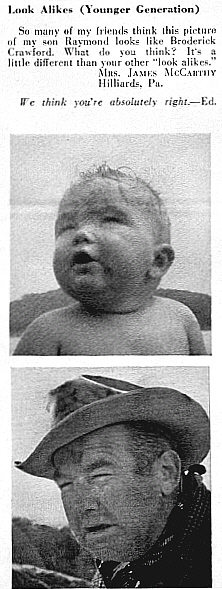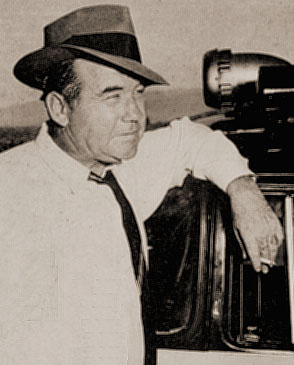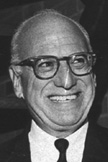
HIGHWAY PATROL
Articles


It was only a question of time until TV, zealously raiding the files of law-enforcement agencies for program material, caught up with the highway police. The result - a new syndicated telefilm series Highway Patrol - offers taut, fast-paced dramatizations.
Although the stories reportedly are culled from the files of highway patrols in various states, the show's action takes place in only one - at least, the men wear the same uniforms and drive the same patrol cars each week. As with Dragnet, Line-Up and other "based-on-the-files-of" shows, Highway Patrol presents an interesting close-up of the ultramodern crime detection methods now in use.
As rough, tough patrol chief Dan Mathews, Broderick Crawford paces the show with a grim-faced, monotonous characterization, though some warmth and humor might not be amiss. Supporting actors have been uniformly good. Most of the action, of course, takes place on the open highway. The filming, sets and other production factors are first-rate.
TVís Newest CRIMEBUSTER
After years on the wrong side of the law, Brod Crawford is now a hero!
by Jim Forrest
Brod Crawford's a "good guy." To those who've ever sat around to play a game of gin rummy with him, this comes as no great surprise, for Brod's a good person to be with, listening when he should, giving advice only when it's solicited and wisely knowing when silence is golden. But to those who've seen him meting out justice on "Highway Patrol," Brod's emergence as TV's newest crime-buster is incredible, because Brod became famous in the movies as a result of his "bad guy" roles!
Now that Brod has crossed over to the right side of the law, he's discovered that on TV, the payoff is terrific! Not only does crime pay, but by being a gangbuster, Brod's show has become one of TV's top crime drama shows all across the country
What makes his show so different? Probably Brod himself. As Dan Mathews, boss of the "Highway Patrol," Brod is no fast-talking but dumb flatfoot. He is a man of great loyalty, compassionate and understanding, trying to enforce law and order not out of mere enjoyment but because he is convinced it is for the interests and welfare of all concerned. What makes Brod truly different in his new role is the fact that he punishes only when he feels it will help not harm the offender and he always sees that the punishment fits the crime. For years the "perfect heel" on screen, Brod is as delighted as most that he can now chalk himself down as a "hero."
He once stalked across screens in dark suits, wearing a perennial leer and talking with a fast talking growl. It wasn't hard, he admits boastfully with a wink, to soon make himself the most hated man in Hollywood.
It got to a point, however, where people were beginning to get their facts mixed up and expected the screen's perfect heel to start a brawl wherever he went. Sure, Brod loves to wrestle with a thirty-foot marlin or slug the daylights out of a golf ball but when he suddenly discovered, with a shock, that he was considered a real villain, he had to come to the bitter but truthful conclusion that crime simply wasn't paying off in anything hut a bad reputation. So what did he do? He turned to crime but this time as a "good guy."

|
| On the set of Highway Patrol. |
Landing the lead of "Highway Patrol" seemed heaven-blessed but was tough as hell, Brod soon learned. "It seemed that if I would just do the opposite of all I had to learn to be a 'bad guy,' it would be a snap, says Brod. "But it wasn't that easy. Even as a 'good guy' I still have to push people around. Of course, I am directing my vengeance against lawbreakers and bad guys but the manner in which I deal with them seems every bit as hard and tough as it's been in all the gangster parts I've played. However, underneath it all I'm supposed to be really pretty soft- hearted. Now, how do you go about getting this characterization across? I finally treated the part as naturally and honestly as I could," Brod sums up, and soon his show hit the top.
In real life, Brod's not unlike Dan Mathews. Ever since he was a tike, Brod had an insatiable curiosity about the kind of things not found between the pages of musty textbooks. Few know he is an ex-prize fighter.
The first time he decided to fight for 'something was as a small boy, when, he gave his parents a third degree about the value of formal schooling. Unconvinced by their arguments, and unsuccessful in making them help break a few of the attendance laws imposed by the Board of Education, Brod gave himself a "leave of absence," utterly certain that all study and no play would surely make him a dull boy. To punish him, Brod's parents "sentenced" him to thirty-eight weeks of hard labor with their then touring road show. That did it. Convinced that school was the lesser of two evils Brod hotfooted it back to his schoolbooks. Not for long, however. Somewhere along the line the acting bug had caught up with him and he was never the same again.
Later, as high school graduation day neared and his parents talked of college, Brod had another uncontrollable urge to break loose from the chains of formal schooling so when graduation day came, he instead took to sea.
Since then,'Brod's had as many exciting experiences as Dan Mathews. He joined the Navy and saw the world. He served in the Army.
When he first became famous in gangster roles, no one could visualize Brod in any other type of role. Then he brilliantly portrayed the role of Lennie in the movie version of John Steinbeck's "Of Mice and Men," and after that, no one could see him as anything but a big, slow-witted Lennie. Now that he's enjoying his pleasant change of pace as the "good guy" of "Highway Patrol." Brod sincerely hopes that no one will ever again visualize him as a "heel." The newness of his role as Dan Mathews is not only challenging but thrilling. Brod admits, spawning many new interests and hobbies away from the cameras. One of these is a sudden fervent love for sports cars, not that he has a desire to break any speed laws (heaven forbid!) but because they can quickly help him head to the hills and get away from it all-to think about what new and exciting gimmick he can bring to the next show-naturally.
Brod copped a coveted Oscar for "All the Kings Men." Watch for him to get an Emmy this year. "Highway Patrol" on different days and stations cross the country is sponsored by Ballantine.
|
ZIV TELEVISION PROGRAMS, INC. U.S. Production and Syndication Company | ||
|
Los Angeles Times October 18, 2001
OBITUARIES
By MYRNA OLIVER, TIMES STAFF WRITER

|
home | photos | sounds | vidcaps | ten-4 day | fans | episodes | FAQ | articles | sources | links | guestbook

|
Pages created with material from the collection of
Gary Goltz. © 1998-2023
For additions, corrections, and comments send e-mail to
 or
or

[Note: Because of excessive spam, we have been forced to display
our e-mail addreses as images,
so you must type our addresses into your e-mail program.]